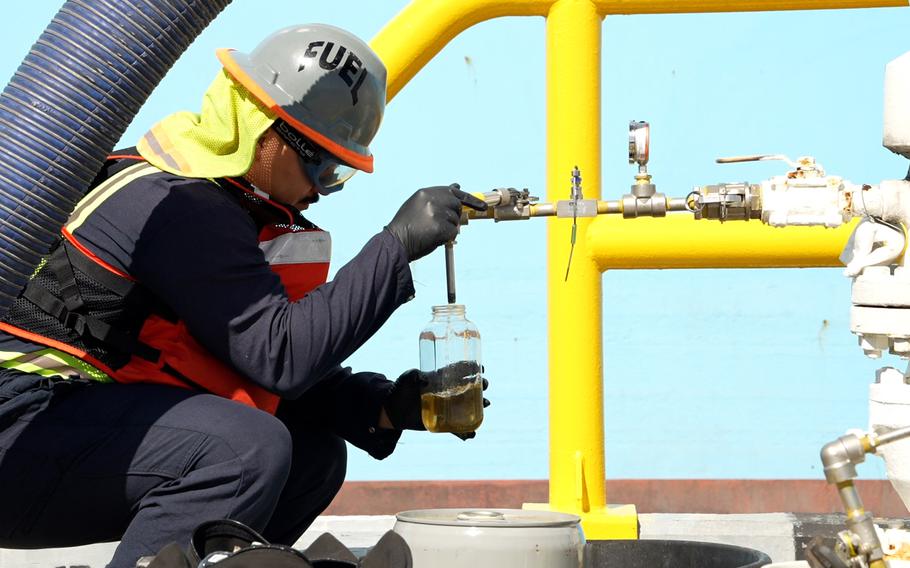
A service member supporting Joint Task Force-Red Hill inspects fuel from the Red Hill Bulk Fuel Storage Facility at Joint Base Pearl Harbor-Hickam, Hawaii, Dec. 7, 2023. (ZaBarr Jones/Defense Department)
A provision in the proposed National Defense Authorization Act would require the federal government to assess health impacts on military families exposed to tap water contaminated by jet fuel from the Navy’s Red Hill storage facility in Hawaii.
Sen. Brian Schatz and Rep. Ed Case, Hawaii Democrats, on Thursday successfully inserted several provisions regarding Red Hill in the NDAA, which specifies spending and policy priorities for the Defense Department, Schatz said in a news release that day.
“The potential health impacts of this crisis remain one of my highest priorities,” Case said in the release.
Schatz and Case sit on defense appropriations subcommittees in the Senate and House, respectively.
The NDAA awaits votes by the full House and Senate and the signature of President Joe Biden.
The language in the bill directs the government to track the health implications of fuel leaks from Red Hill for uniformed service members and their dependents.
The tracking would be done in coordination with the U.S. Environmental Protection Agency and the Hawaii Department of Health “to ensure a holistic and unified approach that documents and ultimately addresses illnesses affecting service members, dependents and civilians,” according to the release.
The underground Red Hill Bulk Fuel Storage Facility, built during World War II just 100 feet atop a crucial Oahu aquifer, was ordered emptied and permanently closed by Defense Secretary Lloyd Austin in March 2022.
The decision came in the wake of a spill of 20,000 gallons of jet fuel in November 2021 that contaminated one of three wells used by the Navy to supply tap water to military communities on and near Joint Base Pearl Harbor-Hickam.
Thousands of residents were forced to relocate for several months, with many complaining of rashes, nausea, diarrhea, dizziness and a host of other health conditions.
Dozens of residents and former residents have joined a federal lawsuit seeking compensation for illnesses and financial losses.
Many have complained that their medical issues have not been properly addressed by the military.
“People who were exposed to toxic fuel from this leak should know what kind of impact that might have on their long-term health and what kind of additional federal help they can get,” Schatz said in the news release.
“This study will give doctors, public health experts, and those affected by the leak a better understanding of what that kind of exposure can do to someone’s health,” Schatz said.
The scope of Red Hill contamination may vastly exceed the November 2021 spill, according to a recent report.
Late last month, the Red Hill Water Alliance Initiative, a working group of state, county and city of Honolulu officials, estimated that as much as 2 million gallons of fuel may have leaked or spilled into the ground from the facility over the past eight decades.
The Department of Veterans Affairs is increasingly concerned about the long-term effects of jet fuel exposure on service members, who can be exposed on the job or in homes on contaminated installations.
“VA works with the Department of Defense and other federal agencies to track these situations and relay relevant and timely information to Veterans,” the agency states on its website in a section devoted to jet fuel exposure.
The website highlights several of the most egregious examples of installation contamination, recently adding the Red Hill area to Camp Lejeune in North Carolina and Karshi Khanabad Air Base in Uzbekistan.
“Scientific research on the long-term effects of exposure to jet fuels is inconclusive; however, if an individual is exposed to jet fuel at very high levels over a long period of time, lung and heart problems may develop,” the website states.
The bill also requires the Defense Department to work with Hawaii officials and the Centers for Disease Control and Prevention to help identify additional resources for those affected by jet fuel contamination.